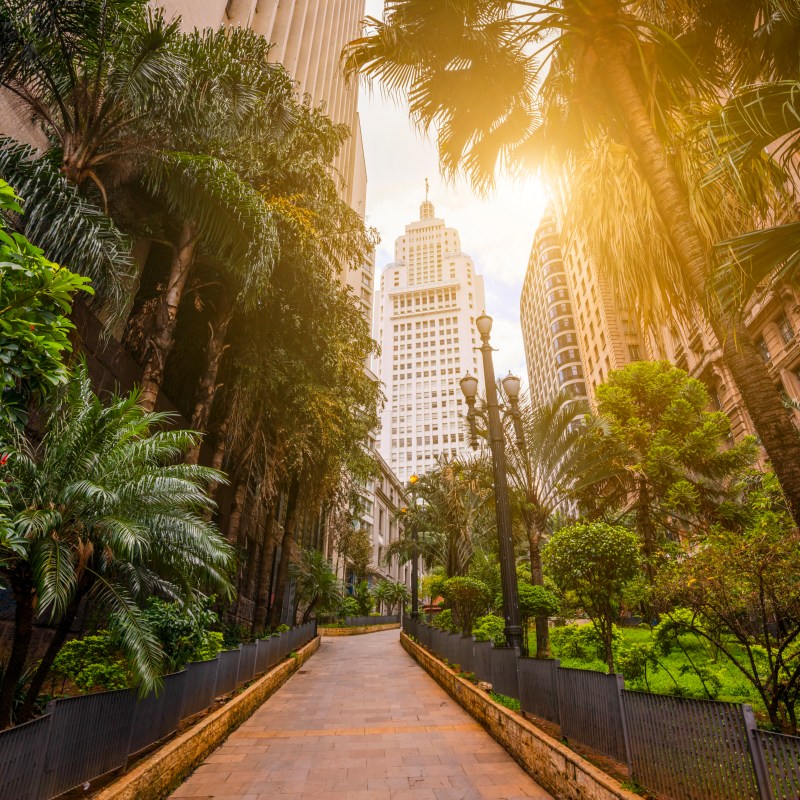
Brazil captures the imagination—it’s not hard to see why it’s become the stuff of travel dreams.
Videos by TravelAwaits
Whether you want to get lost in a larger-than-life city like São Paolo or Rio de Janeiro, want to visit iconic landmarks like Christ the Redeemer and Copacabana Beach, or want to delve into the Amazon Rainforest, there’s something for everyone.
Even Brazil’s lesser-known destinations, from the Pantanal to Iguazu Falls to Lencois Merenhenses National Park, can leave an impact that lasts a lifetime.
Though Americans now need a visa to travel to Brazil, it’s easy to order online—and Americans are flocking to Brazil more each year. Still, it’s not the easiest voyage for the average traveler, as there are more linguistic and cultural barriers compared to other South American and Latin American hotspots.
Want a little crash course for your first visit? Here’s what you need to know about the dos and don’ts in Brazil.
Dos and don’ts in Brazil for first-time visitors

Do: Practice your Portuguese
English isn’t commonly spoken in Brazil, meaning you should have a few Portuguese phrases under your belt when you arrive. Or, if you’re not one for pre-trip studying, make sure to keep a translation app on hand.
Locals are patient when it comes to visitors practicing, so don’t worry about mispronunciations. Your efforts will go a long way—and might even get you an invitation to return to a restaurant or shop.
Don’t: Get upset if someone is late
Showing up on time isn’t part of Brazilian culture. Plain and simple. Even if you set a time to meet up, that time might be up for interpretation. For example, meeting at 3 o’clock probably doesn’t mean right at the turn of the hour. Instead, it might mean anytime within that 3 o’clock period. (This doesn’t usually apply to tours, although I recommend giving your tour guide a little grace if they’re late by 10-15 minutes.)
Do: Kiss both cheeks when greeting women, but shake when greeting men
Brazilians kiss on the cheek when there’s a woman involved in the greeting. In fact, depending on which state you visit, you might kiss once on the cheek, twice, or even three times. But this only applies when there’s a woman involved. Men shouldn’t kiss other men on the cheek as a greeting. Instead, shake hands. (To clarify, men greeting women will still kiss on the cheek.)
Don’t: Wear fancy valuables for all to see
Pickpocketing and theft are risks in major cities. Don’t wear gaudy, valuable jewelry when you’re going out for the day. I’ve also seen tourists recommend not taking out your phone when walking around, as thieves can snatch it and run. In general, be wary about having any valuables out and ripe for the plucking.
Do: Have small bills
Don’t expect to use cards to pay at small shops in Brazil—paying with cash is preferred in many locations. At the same time, don’t walk around with large bills, as these are difficult for cashiers to break, especially if you’re wandering into boutiques, mom-and-pop shops, and similar locations. It’s also good to have small bills on hand for leaving tips, which I’ll discuss below.
Don’t: Bring up Argentina too often
Brazil and Argentina have an antagonistic relationship. (To be fair, it seems like most South American countries have a bone to pick with Argentina.) Be mindful when bringing up politics in general throughout Brazil, as it’s a touchy subject.
But know that heaping heavy praise on Argentina could offend some Brazilians. If you’ve visited Spain and Portugal, you know the type of tension I’m referencing. They love to hate each other.
Do: Leave a small tip for servers
Most working wages in Brazil are low, meaning that leaving behind a small tip for servers at restaurants and bars goes a long way. As a tourist in Brazil, expect to tip servers, along with tour guides. But that’s it.
There isn’t a big tipping culture in Brazil. And if you do tip as an American, do not tip in USD. It’s a hassle for people to convert, and also pricey. It might also rub some locals the wrong way. After all, if a Brazilian came to the United States and tipped you in reais, you would be a little baffled, right?
Don’t: Be offended if you’re called a gringo
I usually dislike being called a gringa or, here in Spain, a guiri, because it’s thrown around as a way to make foreigners and immigrants feel unwelcome.
That being said, the term doesn’t always have a negative connotation—and certainly not in Brazil. If you’re called a gringo/a in Brazil, know that it’s a very broad, general term used to describe outsiders, regardless of race, religion, or nationality. Lovers might even call their foreign partner ‘my gringo’.
Do: Accept invitations for social gatherings
If you’re visiting for a longer period of time, you might make a few local acquaintances during your stay. Brazilians are friendly and chatty, similar to Americans. If you get an invitation to a social event, take up the offer! Just remember what we discussed about showing up on time. If you’re invited to a barbecue that starts at 3 o’clock, don’t arrive before 4 o’clock.
Don’t: Speak too directly
If you grew up in the Midwest or the South, this might be the most obvious of the dos and don’ts in Brazil: don’t be too blunt with your delivery. A direct answer might feel like a slap in the face to some. But if you’re from New York City, San Francisco, or Boston, you might be direct with your answers—especially when saying no.
In Brazil, it’s expected to dance around direct answers. For example, if someone offers you a drink and you aren’t interested, you might say, “I’m so full, I couldn’t. I’m sorry. It looks delicious.” At which point, you might be offered the drink again. That’s when you would gently insist that you don’t want it for a second time.
Do: Gossip
If you happen to make friends in Brazil, it’s likely they’ll have a few strong opinions to share with you. If you normally shy away from gossip or find it needlessly salacious, don’t mind the commentary that you’re likely to hear in Brazil. It isn’t viewed in a negative light. In fact, it’s seen as normal in most contexts.
Don’t: Drive
There’s no need to drive in Brazil as a tourist. In big cities, drivers are aggressive, while road rules are complicated, and many zones are prone to congestion. In short, let the experts handle it for you. As a perk, Uber works in Brazil and is affordable. There’s no need to give yourself a headache (or a heart attack) trying to navigate the streets behind the wheel.
